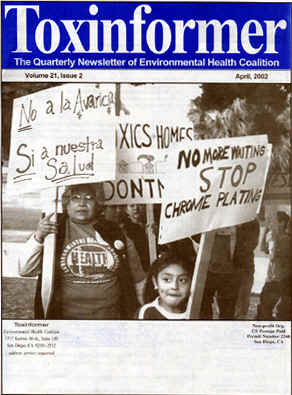
of toxic site during 24-hour vigil
NAFTA report confirms health risks of abandoned maquiladora
 |
| Lourdes Luján, left, Olga Rendón and Magdalena Cerda listen skeptically to a speech by a Mexican environmental official during the first hours of the 24-hour vigil. |
Residents of Colonia Chilpancingo took to the streets of Tijuana on April 10 to send a message to President Fox and the Mexican government: Clean up Metales y Derivados now!
More than 30 Chilpancingo residents and members of Environmental Health Coalition held a 24-hour vigil in front of the offices of Procuraduría Federal de Protección al Ambiente (PROFEPA), the enforcement arm of Mexico’s environmental protection agency, demanding that the Mexican government take immediate action to clean up toxic waste at Metales y Derivados. The abandoned lead smelter stands just 600 yards from Colonia Chilpancingo, home to more than 10,000 people.
Activists lined the sidewalks in front of the offices and began the vigil with a press conference calling on Fox and Mexican officials to take responsibility and clean up the more than 7,000 metric tons of toxic waste that remain at the site. Maricarmen Viera, a representative of the Office of Human Rights for Baja California, also offered a statement of support for the people of Chilpancingo.
"We have been suffering from health problems caused by contamination for a long time. This is our last call for the government of Mexico to solve the problem," said Lourdes Luján, a Chilpancingo resident and organizer with Colectivo Chilpancingo Pro Justicia Ambiental, an affiliate of EHC. "Our vigil represents the collective voices of the people of Chilpancingo demanding that President Fox and Mexico take responsibility to protect our health and clean up Metales y Derivados now. We will remain here for the next 24-hours, but our vigil will not end until Mexico answers our demands and cleans up this site."
Metales y Derivados recycled lead from car batteries for 12 years before Mexican authorities closed it in March of 1994 for violations of Mexican environmental law. The smelter’s parent company, San Diego-based New Frontier Trading Corporation, left behind more than 7,000 metric tons of toxic waste when its owners abandoned the site. The person responsible for the company, José Khan, fled Mexico after a warrant was issued for his arrest in 1995 for alleged environmental crimes. Khan currently lives in San Diego.
Following the press conference, Alejandro Alvarez Cárdenas, a PROFEPA representative, addressed the crowd and members of the media. He claimed that the responsibility for the Metales cleanup falls on Khan, and insisted that Mexico could not shoulder the burden of financing the cleanup project.
This all-too familiar response from the Mexican official was not well received by Chilpancingo resident Olga Rendón.
"The health of our families is at risk! We’ve waited too long for a solution to this problem," said Rendón, also a Colectivo Chilpancingo organizer. "It is time for President Fox and the Mexican government to stand up for human rights by cleaning up Metales y Derivados. The community of Colonia Chilpancingo deserves and demands a safe, clean environment in which to live, work and raise our children."
NAFTA report confirms the problem
A report released in February by the environmental oversight commission of the North American Free Trade Agreement (NAFTA) validated community health concerns about the toxic contamination from Metales y Derivados. Independent analysis by experts cited in the report confirms the need for urgent action in the case to halt adverse health effects on people living or working in proximity to the unsecured, hazardous site. A petition filed in 1998 by EHC and Colonia Chilpancingo prompted the NAFTA report.
"Mexico has failed to enforce its laws
in this case," said EHC policy advocate César Luna. "It’s
imperative that the Mexican government take definite and concrete steps
immediately to protect the health and environment of residents and workers
impacted by Metales y Derivados."
The report is a compilation of government documents, technical information
and other public data. Toxicological experts cited in the report indicate
that substances at the Metales site pose "grave harm to human
health." It shows that levels of lead contaminate found in the surface
soil at the site are 551 times higher than the U.S. Environmental Protection
Agency Preliminary Remediation Goal for contaminated residential soil. Even
more than a mile way from the site, levels of lead contaminates are as much
as 55 times higher than EPA standards.
According to the report, the Metales y Derivados site, "is not secured to prevent any person from entering the site and avert direct human contact with the pollutants. The pollutants are not contained in a manner to prevent their dispersal. It is easy for anyone, including children, to enter the site and come into direct contact with the hazardous waste – both the lead slag piles and the waste kept in sacks and drums."
"This is the first, independent, international report that supports what the members of Colonia Chilpancingo have been saying all along. However, the report falls far short of providing a remedy," said Luna.
NAFTA’s dirty secret
In the report, the Mexican government cites the country’s lack of financial resources as a major obstacle for addressing community concerns by cleaning up the hazardous Metales site. However, Mexico’s recent actions to settle another NAFTA dispute cast doubt on the country’s "lack of resources" defense. In 1996, Metalclad, a U.S.-owned company, filed a claim against Mexico after a city in San Luis Potosí state prevented the waste-disposal company from opening a toxic dump. The Mexican government paid Metalclad $16 million in October 2001 to resolve the case.
"This report reveals a fundamental flaw of NAFTA," Luna said. "While individual corporations can sue NAFTA countries and are able to obtain millions of dollars from them, communities get only a toothless report. This further exposes the double standard of NAFTA’s mechanisms for governmental response to community as opposed to corporate concerns."
The report, which culminated the lengthy and complex petition process, does not draw conclusions or recommendations as to how to solve cases like Metales y Derivados or others brought to the tri-national commission. "It is as if someone tells you that you have a malignant tumor but does not provide any treatment," Luján said.
The vigil continues
President Fox and Victor Lichtinger, Mexico’s
Environmental Minister, have received more than 800 letters from Colonia
residents asking for a response to the Metales y Derivados problem.
Both officials also recently received another letter from residents
requesting that they visit Chilpancingo and meet with residents to discuss a
cleanup plan. So far Fox and Lichtinger have not responded. But the problem
persists, and new efforts for addressing the problem are being investigated.
In the words of Lourdes Luján, the vigil continues.
